NHS Cataract Surgery
Supporting you every step of the way
Cataract surgery
Cataract surgery is the most common operation performed in the UK today and has, on average, a 99% success rate. It’s currently the only reliable treatment for cataracts.
Before you look at the details of your cataract surgery, there are two very important things you need to know that should help to put your mind at rest:
1. There are NO needles involved
All the anaesthetics and medication for your eyes are administered by eye drops and a tiny pellet is used to dilate the pupils, so there’s no need to worry about any needles or injections.
2. It’s one of the quickest operations you can have
You will be at the hospital on the day of your cataract surgery for about 3 hours, but the actual surgery itself usually only lasts about 20 minutes.
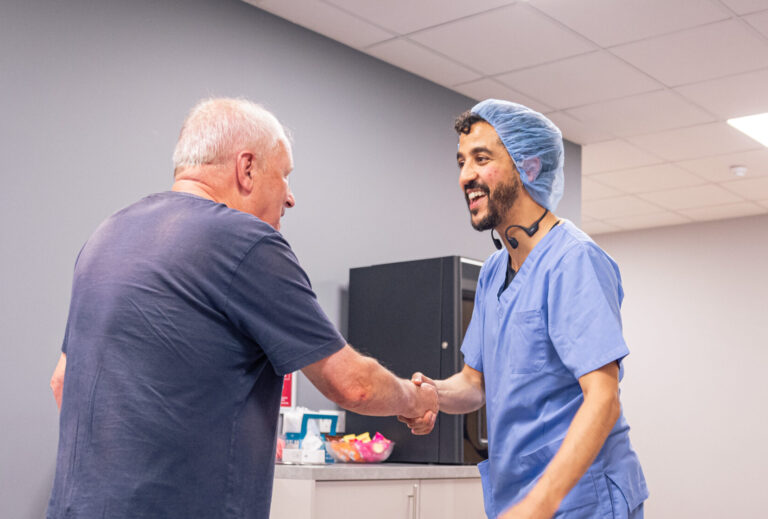
SpaMedica's experience
As the UK’s largest provider of NHS cataract surgery, SpaMedica performs tens of thousands of successful cataract surgeries every year. Only 0.46% of our patients experience the most common complication of cataract surgery, a condition known as posterior capsule rupture, meaning our complication rates are well below the national benchmark of 1.1%.
Advice and recommendations for your cataract surgery day
It’s normal to be apprehensive about your surgery, but please be rest assured that the SpaMedica team are very caring, extremely friendly and will support you through every step on your surgery day. They’ll put your mind at ease, explain what’s happening at each stage, discuss any concerns you may have and make you as comfortable as possible throughout your stay.
- The time given for your appointment is the time you should arrive at the eye hospital and NOT the time of your cataract surgery – arriving earlier will mean a longer wait for you.
- You’ll need to bring your current glasses, a list of your current medications, your record book (if you’re diabetic or taking blood-thinning medication) and a contact number for a relative/friend. If you wear contact lenses, these should not be worn for at least 24 hours before your surgery.
- Please arrange transport to and from the hospital – your eyes will be dilated for surgery and this causes blurred vision and sensitivity to light, meaning that you won’t be able to drive, so it’s important to make sure you organise a lift or arrange transport. SpaMedica provides free transport for some patients, based on your location and other criteria – if you’re struggling to find transport, please speak to a member of our referrals team to see if you qualify for free transport.
- We recommend eating a light meal before you arrive at the hospital.
- Please take all your medications as normal, unless we have specifically advised you not to.
- You should wear comfortable and loose-fitting clothing – you will not need to wear a hospital gown.
- We recommend you wear dark coloured clothing – we use iodine during surgery and this can sometimes run down your neck and may stain lighter clothing.
- Remove all make-up before arriving at the hospital.
- Please try not to bring any valuables with you – we have lockers and areas for you to leave bags etc during surgery, but we cannot guarantee their safety.
Would you like a chaperone? It’s your choice. This can be a family member, friend or a trained member of staff. Please let us know upon arrival if you would like someone to accompany you for examination or consultation.
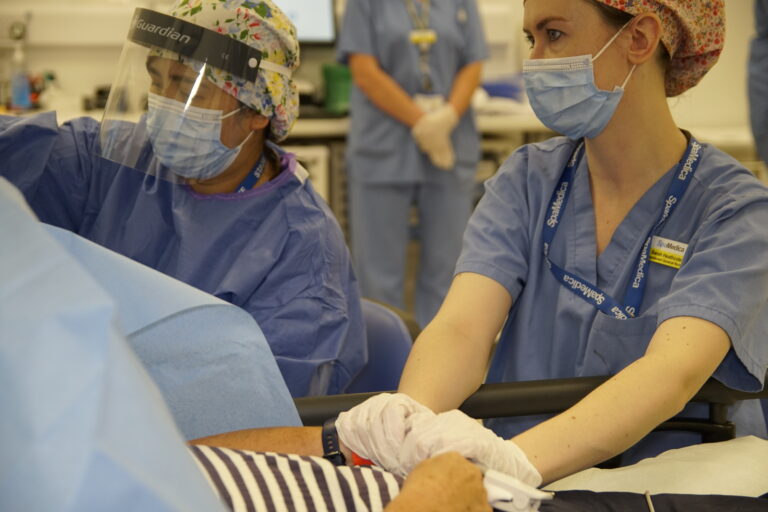
Step-by-step guide to your cataract surgery
Please click below to get a step-by-step guide to your cataract surgery appointment. This gives all the details and timings of your surgery – you’ll be in the hospital about 3 hours in total and then you’ll be free to go home, with all the information you need about post-surgery eye care. And remember, we’ll be right there with you every step of the way, and ready to hold your hand, if needed.
Can I still have surgery if I have a cough or cold?
You must inform the operating surgeon if you have a cough. If you can control your cough, surgery can proceed, but you must let the staff know if you need to cough so that the surgery can be paused if necessary. If you cannot control your cough, your GP may be able to prescribe something that will suppress it. If you have a cold or are feeling unwell, you should not proceed with surgery. Please inform us as soon as possible so we can re-book your theatre slot at a time that’s convenient for you.
I'm taking antibiotics. Can I still have surgery?
Please inform us if you are taking antibiotics. In some cases, long-term antibiotics will not stop you from having surgery. However, if you have an active infection, your surgery should be rebooked until resolved.
Can I have a general anaesthetic?
SpaMedica does not perform cataract surgery under general anaesthetic, so you won’t be put to sleep for your operation and you’ll be able to go home on the same day as your surgery. The majority of cataract surgery is performed using local anaesthetic, which is administered using eye drops. The eye drops numb your eye to stop you feeling any pain during your operation.
If you want to be put to sleep for your cataract surgery, you’ll need to tell your optician or GP before they refer you for treatment so they can identify a suitable treatment provider.
I take blood thinners/anticoagulants; do you need to know my reading?
Please inform the staff at your pre-assessment appointment if you are taking blood-thinning medication. You must continue your blood thinners, inform your anti-coagulation clinic, and obtain an INR result within a week of your surgery.
My INR is out of range. Can I still have surgery?
If your INR is out of range, you should contact us so that we can discuss your readings with your surgeon and make a decision about whether we can proceed with your surgery, or whether we’ll need to re-book it for a later date.
Will i still need glasses after cataract surgery?
When you have cataract surgery, your eye’s natural lens is replaced with an artificial lens (also referred to as an intraocular lens/IOL). If your cataract surgery is carried out on the NHS, then you’ll only have the option of a monofocal lens, which can correct long or short-sightedness, but not both. Your lens can be set to focus on objects that are close up, or objects that are in the distance, but it won’t be able to switch between the two. This means, if you had issues with both long and short-sightedness and were wearing glasses before cataract surgery, it’s likely that you’ll still need them afterwards, but you’ll usually need to get a new prescription to account for the improvement in your vision after cataract surgery.
If, however, you’re having your cataract surgery done privately, then you’ll be able to choose from a wider range of lenses, including monofocal, varifocal and toric lenses. Toric lenses are designed to correct astigmatism and can be either monofocal or varifocal.
How long will my vision be blurry for after cataract surgery?
When you’ve had cataract surgery, you may initially have blurred vision. You may also experience some sensitivity to light, itching, aching and eye-watering. These symptoms are all completely normal and should get better within a few days. Most patients’ vision is back to normal within a day of their cataract surgery.
In some cases, after cataract surgery, your vision might remain blurry for a couple of weeks. This isn’t unusual, so don’t worry. Just keep taking your eye drops and ensure that you don’t rub or touch your eye. This will allow it to heal properly and give your eye time to adjust to the replacement lens that is inserted during cataract surgery.
Cataract surgery can cause your eye to water more than usual, which may lead to your vision becoming blurry. If you notice your eye feels sticky, you can bathe it to remove any residue. You’ll usually be provided with a pack of sterile swabs by your surgeon, for using when bathing your eye. When bathing your eye, boil some water to sterilise it, wait for it to cool enough to use comfortably, then use your sterile swabs to bathe your eye with the water. This should remove any gunk from your eye and help to reduce the blurring of your vision.
You can repeat this as often as is necessary, and your eye should stop watering within a few days to a week or so.
Did you find what you were looking for?
Thank you for feedback
Other patient journey information
-
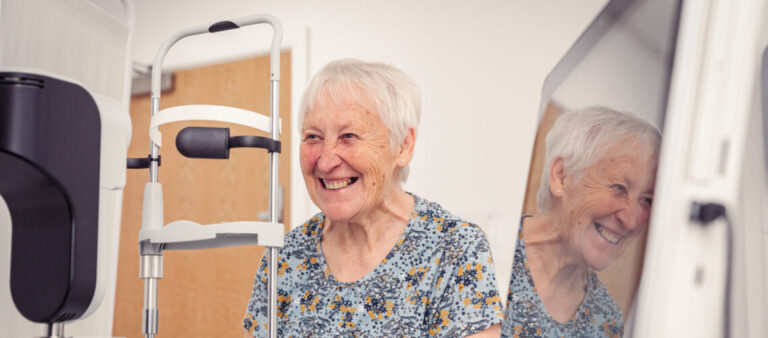
Pre-op assessment
Here’s what to expect during your first appointment with us, where you’ll undergo some non-invasive eye tests in preparation for your cataract surgery.
Pre-op appointment -
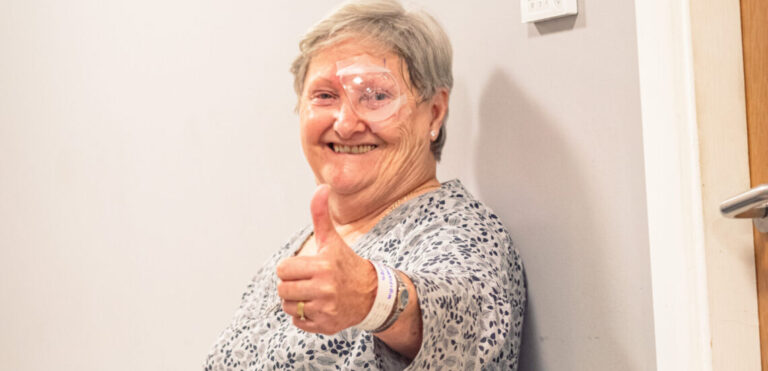
After surgery care
If you’re wondering how long it takes to recover from cataract surgery - and what you can and can’t do while your eye is healing - this page tells you everything you need to know.
View information -
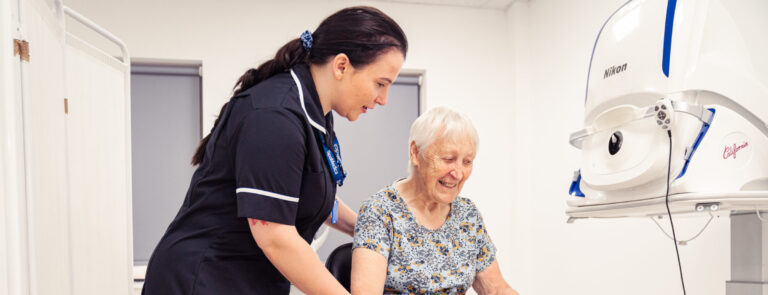
Post-op assessment
Find out what happens during your final appointment with us, where we’ll check your eyes to make sure your surgery was a success and let you know if you need a new glasses prescription.
After cataract surgery
A-Z Resources
Our Resources section features an A-Z glossary of frequently asked questions about cataracts, some advice about how your loved ones can support you during your treatment, and some top tips on looking after your eyes.
A-Z Resources

